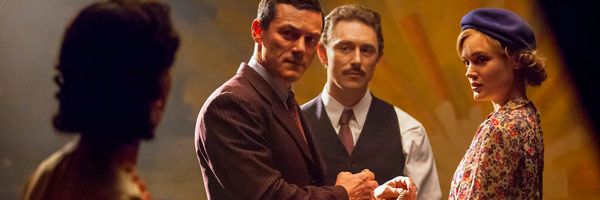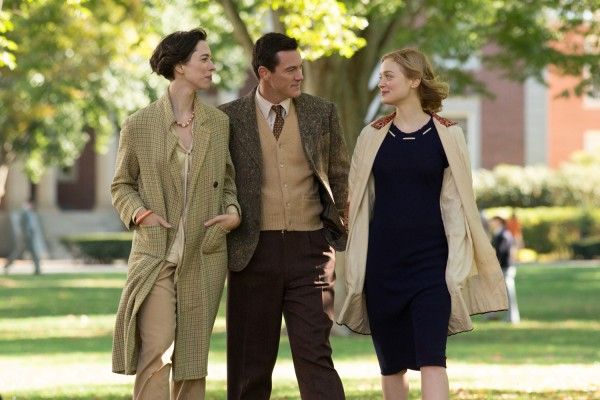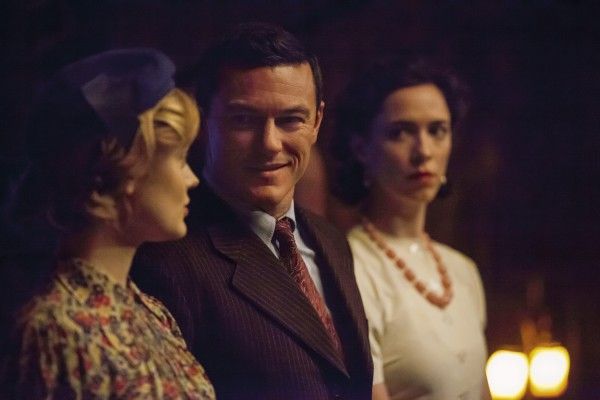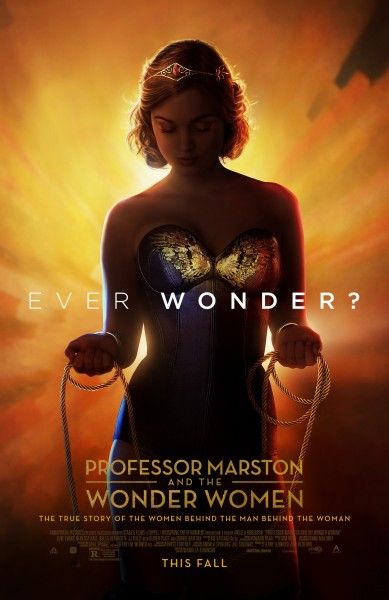[NOTE: This is a re-post of my review from the Toronto International Film Festival; Professor Marston and the Wonder Women hits theaters this weekend]
How does one of the most iconic feminist characters in pop culture history get created? The true story is stranger than fiction, but captured in compelling, compassionate, and loving fashion in Professor Marston and the Wonder Women. This tale of Wonder Woman creator William Moulton Marston chronicles how the psychologist and his wife’s polyamorous relationship with another woman paved the way to Wonder Woman, but more importantly it’s a film about love, acceptance, and feminism. Anchored by a powerhouse performance from Rebecca Hall, Professor Marston and the Wonder Women clips by at a rapid and compelling pace, and while the narrative gets a bit rushed when it’s time to actually tackle the comics character’s creation, the character work that precedes it brings this thing home in emotional fashion.
Written and directed by Angela Robinson, the film begins in 1928 as we’re introduced to Professor William Moulton Marston (Luke Evans), who teaches psychology alongside his wife Elizabeth Marston (Hall), a brilliant woman who continues to be denied her PhD because, frankly, she’s a lady. The Marstons are presented as intellectual, curious, and flirty, and they take a particular interest in a student named Olive Byrne (Bella Heathcote), who becomes Professor Marston’s Teaching Assistant and befriends the duo. Olive’s beauty is unparalleled, and indeed in a standout scene early in the film, the Marstons watch Olive from afar as Elizabeth assess how her beauty—psychologically—is both an asset and a burden for the young girl. It’s a brilliantly written, directed, and acted scene that serves to underline the dynamics present through the film.
Olive aids the Marstons in their experiments and is personally responsible for a breakthrough in their invention of the lie detector, which they test out on each other and which is used in dramatic fashion to lay bare everyone’s true feelings. After some hesitance, tears, and a bit of fighting, the trio consummate their relationship—it’s made abundantly clear that all three are in love with one another, and we see as they try to build a life together (which includes children) in a world that does not accept their relationship.
What really stands out about Professor Marston and the Wonder Women is how different the film might have been if it had been made by a male director. The prospect of a threesome relationship could easily be fetishized, especially in the sex scenes, but Robinson is intensely focused on ensuring that every shot and frame reinforce the genuine love these people have for each other. Don’t get me wrong, the love scenes are downright sexy, but there’s no male gaze here—the focus is always on the pleasure of the women, not of the man, and that goes a long way towards expressing the dynamics in play.
Indeed, Marston himself came up DISC theory to describe relationships, which establishes titles like dominance, inducement, submission, and compliance, and even before we get to the sex scenes, we see that Elizabeth is the dominant one in their relationship. It is vital that we understand Elizabeth approves of (and desires) this polygamous relationship, lest the story come off like William was simply a dude who wanted two wives. Again, I think having a female writer and director steering this story makes a huge difference, and Robinson uses every tool at her disposal to tell this tale visually in an engaging and encouraging way.
As for the performances, Luke Evans does a swell job bringing Marston to life in a colorful form, but this movie is really far more interested in Elizabeth and Olive, and the actresses completely deliver. Hall in particular is a standout, and it’s clear from the opening scenes that she’s going to own this movie. She navigates complicated emotional territory as she must weigh the cost that living this kind of life has on her family and children, while also finally finding acceptance in acting on feelings she’s had bottled up inside.
That’s a big part of what this movie’s about. That the relationship at the center of Professor Marston is polygamous is beside the point—it’s simply that it’s “out of the ordinary,” and thus I feel the film makes a welcome addition to the growing library of queer cinema. The performances of Hall and Heathcote are rich with complexity, capturing small moments of acknowledgement or desire here and there in the early parts of the film.
When the story finally gets to the creation of Wonder Woman, the film gets a bit too rushed and the timeline a little muddled, but it’s fascinating to see how the influence of these two strong, confident, and different women quite literally gave birth to a feminist icon. Marston makes not effort to hide the fact that he wants to get his ideas of DISC and feminism across to readers subconsciously, and that bleeds into the images and storylines that permeate the first Wonder Woman comics.
Moreover, the film’s rich exploration of the ideals of William, Elizabeth, and Olive, also helps to explain the seemingly anachronistic idea of a feminist superhero “wearing a bathing suit.” The trio discusses and debates what it means to be feminist, and the balance between beauty, intelligence, and power. It adds to the richness of the film and will hopefully help get across the idea that feminism is not just one thing.
Love is love is love is love, but we take for granted that some spend their lives afraid of expressing that love. Professor Marston and the Wonder Women is a terrific story of finding acceptance, challenging the norm, and debating ideas in an intelligent instead of belligerent manner, while also celebrating the diversity and resilience of the female gender. And, of course, how all of this resulted in the creation of one Diana Prince.
Rating: B+




